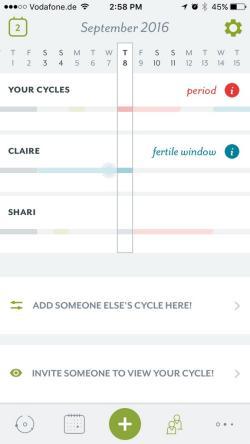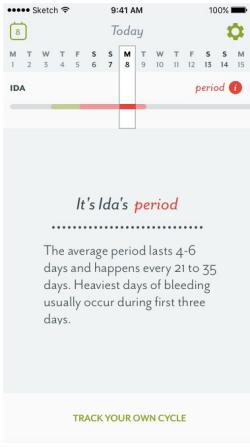People who keep tabs on their menstruation with Clue, a popular period-tracking app, can now share information about their cycles with anyone else who’s downloaded the app. The company is marketing it as a way to better communicate with sexual partners, bond with friends, and help young girls get a handle on their changing bodies.
Clue says cycle-sharing is “the most requested feature since we initially launched Clue back in 2013.” A user can choose to share a certain set of data—current and predicted days when she’s most fertile, menstruating, or experiencing PMS—with another user, who’ll see it represented with colored stripes in a setup that looks something like Google Calendar. The app allows users to track all kinds of other things, such as sex (protected or unprotected) and consistency of stool or cervical fluid, but none of that stuff goes through to other users. A user can end the connection at any time.

Clue
Why would someone want another person to have intimate knowledge of her menstrual patterns? Clue suggests that it’ll help smooth over communication between parents, children, and partners: A mother monitoring her daughter’s cycle can stock her bathroom with tampons without waiting for an awkward request. A couple that’s trying to get pregnant (or avoid getting pregnant) can share responsibility for monitoring a woman’s fertility windows and timing sex around her ovulation. Then there’s the most obvious reason: not having to halt foreplay to notify lovers that you’re on your period. If they’re tracking your cycle on their phones, “it’s cool, they already know,” Clue says. “Maybe they even picked up something fun for shower sex, or put down a towel.” A preplanned period sex towel—how sweet!
As for your friends, Clue notes, sharing period info as a group continues in the legacy of ancient menstrual traditions, “from red tents to moon lodges, from menstrual-honoring to oppression.” Oppression? Whether users employ the app’s calendar to oppress friends or celebrate the coming of their monthly moon juice, it seems like period schedules only really need to be shared among friends on a need-to-know basis. Clue disagrees. Cycle-syncing among cohabitors is most likely a myth, but “with information about each other’s cycles, you can plan your evening, weekend, or sport activities with friends,” the company says. Were you planning on camping with Linda this weekend? Better make it glamping—she’ll be heavy-bleeding! Oh, was pool time in the cards? Surprise Winnie with a box of tampons so she can come along, too!

Clue
Some of Clue’s suggested reasons for sharing cycle data seem far-fetched. People don’t usually have to buy new pads or tampons every cycle, so pre-empting a loved one’s needs might land her with redundant supplies or the wrong kind. A partner buying painkillers as a surprise pre-PMS gift sounds creepy. And it’s difficult to imagine this proposed scenario between a mother and a daughter working out as planned: “Connecting with your child through Clue allows them to see your cycle, which gives them the context to understand changes their own body is going through.”
Historically, keeping tabs someone else’s period has been an activity most enjoyed by dirtbag men. Just this month, the internet uttered a hybrid gasp/giggle at a story about an Australian woman who found out her male colleagues were tracking her menstrual cycles on a shared work calendar so they could avoid her during potential PMS days. Several apps have been designed by and marketed to men for this purpose. One allows for multiple passwords in case one girlfriend asks to see the app and the user wants to conceal the fact that he’s tracking multiple women; another calls PMS “Psychotic Mood Shifts.” Clue’s version is in a whole different category: The menstruators are the only ones who can share their cycle data. Clue also warns users that some people could use the information for unsavory purposes. “We recommend not sharing your cycle information with anyone you don’t feel close to, or who may use the information in ways you don’t want it used,” the company writes, “such as pressuring you to have unprotected sex, avoiding you at certain times in your cycle, or someone who is simply judgmental about you or your body.”
Still, given access to the intimate data of another person’s reproductive happenings, even the most well-meaning partner or friend might start to read into mood shifts or take the menstruator’s feelings less seriously if they bubble up during a predicted PMS window. Clue’s new feature seems to exacerbate the potential for arguments about emotional underpinnings inferred from a couple of colored lines on a period app. We can control the data our loved ones see, but we can’t control their interpretation.
